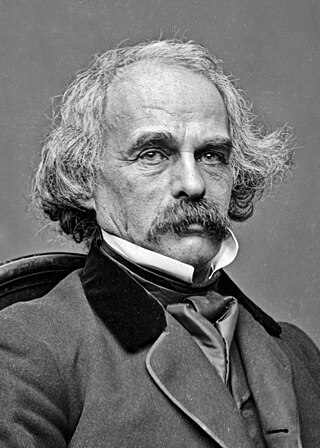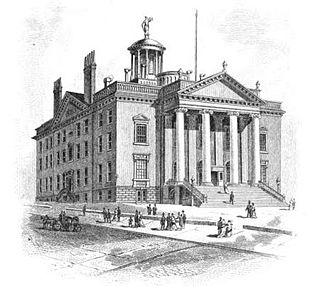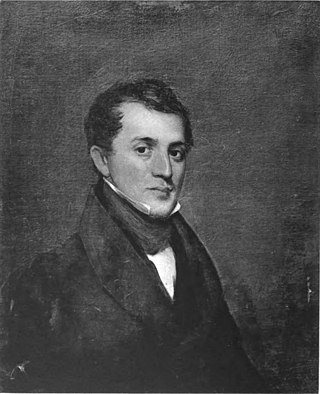
Nathaniel Hawthorne was an American novelist and short story writer. His works often focus on history, morality, and religion.

Albert Paddock Crary, was an American pioneer polar geophysicist and glaciologist. He was the first person to have set foot on both the North and South Poles, having made it to the North Pole on May 3, 1952 and then to the South Pole on February 12, 1961, as the leader of a team of eight. The South Pole expedition set out from McMurdo Station on December 10, 1960, using three Snowcats with trailers. Crary was the seventh expedition leader to arrive at the South Pole by surface transportation. He was widely admired for his intellect, wit, skills and as a great administrator for polar research expeditions.

Benjamin Franklin Butler was a lawyer from the state of New York. A professional and political ally of Martin Van Buren, among the many elective and appointive positions he held were Attorney General of the United States and United States Attorney for the Southern District of New York. He was also a founder of New York University and one of the founders of the Children's Village school in New York City.

George Washington McCrary was a United States representative from Iowa, the 33rd United States Secretary of War and a United States circuit judge of the United States Circuit Courts for the Eighth Circuit.

Jacob Crowninshield was a U.S. Representative from Massachusetts and appointee to the position of U.S. Secretary of the Navy, which he never filled. His brother Benjamin Williams Crowninshield did successfully hold the post; the Crowninshield family in general was prominent in early American maritime affairs. He was the grandfather of Arent S. Crowninshield.

Isaac Edwin Crary was an American lawyer and politician. He was the first elected U.S. Representative from the state of Michigan. He served in the Michigan House of Representatives including as Speaker.

John Glover was an American fisherman, merchant, politician, and military leader from Marblehead, Massachusetts, who served as a brigadier general in the Continental Army during the American Revolutionary War. He is most famous in American history for his role in helping found what would become the United States Navy, along with his regiment rowing Washington across the Delaware, the Battle of Long Island, and leading one of the first integrated regiments in the American Revolution.
John Huggins Boyd was an American politician and a U.S. Representative from New York. He was the last member of the Whig Party to represent New York's 14th District.

John Savage was an American lawyer and politician.
Edward Livingston was an American attorney and politician. He served as Clerk and Speaker of the New York State Assembly.

Josiah Ogden Hoffman was an American lawyer and politician.

Nelson John Beach was an American surveyor, businessman and politician from New York.
Events from the year 1787 in the United States. The United States Constitution was written and the ratification process began.
The Columbian Institute for the Promotion of Arts and Sciences (1816–1838) was a literary and science institution in Washington, D.C., founded by Dr. Edward Cutbush (1772–1843), a naval surgeon. Thomas Law had earlier suggested of such a society "at the seat of government." It was the first "learned society" established in Washington and was organized on June 28, 1816, sixteen years after the city was occupied, and less than two years after the invasion by the British troops. The second article of its constitution states: "The Institute shall consist of mathematical, physical, moral and political sciences, general literature and fine arts."

The 51st New York State Legislature, consisting of the New York State Senate and the New York State Assembly, met from January 1 to December 10, 1828, during the fourth year of DeWitt Clinton's second tenure as Governor of New York, and—after Clinton's death—while Nathaniel Pitcher was Governor, in Albany.

The 52nd New York State Legislature, consisting of the New York State Senate and the New York State Assembly, met from January 6 to May 5, 1829, during the short tenure of Martin Van Buren as Governor of New York, and—after Van Buren's resignation—during the first year of Enos T. Throop's governorship, in Albany.

Alice Crary is an American philosopher who currently holds the positions of University Distinguished Professor at the Graduate Faculty, The New School for Social Research in New York City and Visiting Fellow at Regent's Park College, University of Oxford, U.K..

Richard Irvin was a Scottish-American merchant and banker who served as the president of the Saint Andrew's Society of the State of New York.
William Myron King, also known as Colonel King for most of his life, was an American pioneer merchant and Oregon state legislator. He served four terms in Oregon's territorial legislature. This included one term as Speaker of the Oregon House of Representatives during the 1851 legislative session. Before immigrating to Oregon, King lived and worked in New York, Pennsylvania, Ohio, and Missouri. After moving to Oregon in 1848, he became a merchant in Portland, and was later the county judge for Multnomah County and a member of Portland's city council.

John Clarke Lee was an American lawyer, merchant, banker and politician who co-founded the prominent stock brokerage firm of Lee, Higginson & Co.